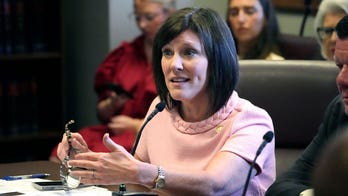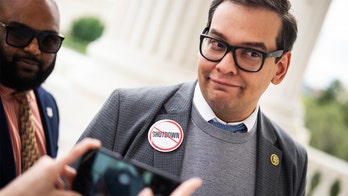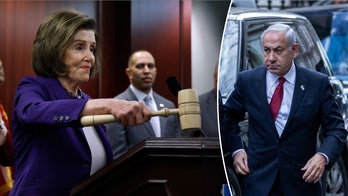America has been going through something of a political time-warp in the aftermath of the Tucson massacre.
The public discussion again and again harkens back to the mid-1990s when the Oklahoma City bombing spurred the American elite to a lengthy discussion about the rise of radicals on the right. Reporters and analysts this week have endlessly reprised the arguments of 15 years ago.
Will President Obama's memorial speech at the University of Arizona evoke Bill Clinton's mix of sympathy and political accusation in the aftermath of the Oklahoma City bombing? Is a toxic political climate to blame for setting off a madman? Are conservative opinion mongers to blame?
Even some of the faces are the same.
Sarah Palin was a 31-year-old city councilwoman in Wasilla, Alaska when Timothy McVeigh killed 168 people with a truck bomb at the Alfred P. Murrah Federal Building on April 19, 1995. And Glenn Beck, also 31 at the time, was a morning show host at a Top 40 radio station in Connecticut. Neither could have imagined that they would one day be blamed for the attempted murder of a congresswoman.
But in evidence of what must be the most successful career in radio broadcasting since Guglielmo Marconi, Rush Limbaugh has managed to be blamed for both McVeigh's atrocious attack and an assassination attempt on a congresswoman 15 years apart.
But as we learn more about the attack in Tucson and its alleged perpetrator, Jared Loughner, it becomes clear that the two events are very different.
McVeigh, working with the help of Terry Nichols, plotted and carried out an act of mass murder in furtherance of creating a wider conflict. Their terrorist attack echoed the work of abolitionist John Brown, Leon Czolgosz, the anarchist who killed President William McKinley, and even Unabomber Ted Kaczynski.
McVeigh and Nichol's worldview may have been both sinister and puerile, but it was, nonetheless, coherent. Racist fantasies and apocalyptic ambitions are the stuff of madmen. But like their homicidal forbearers, McVeigh and Nichols were acting out on the sentiments held by many others.
Loughner, though, seems to be impervious to the opinions of the wider world. The 22-year-old's fixation on grammar, numerical patterns and "conscious dreaming" provide strong evidence of schizophrenia, an affliction that usually manifests itself in young adulthood.
Rather than the grand designs of McVeigh, Brown, Czolgsoz and Kaczynski, Loughner demonstrates the small, personal obsessions of a homicidal maniac. The picture of Loughner is more like that of Seung-Hui Cho who killed 32 at Virginia Tech in 2007 or Eric Harris and Dylan Klebold who killed 13 at Columbine High School in 1999.
But it has taken days for the public discussion of the Tucson shootings to turn to the questions that followed other mass murders of recent history. Mental health, gun control, the isolation of individuals in a disconnected culture and similar topics have now appeared, but only after days of hyper-charged political debate.
The reason may be that while Loughner's alleged crime bears little resemblance to what Timothy McVeigh did 15 years ago, the political climate bears significant similarities.
We often forget how the national unity brought about by the 9/11 attacks cooled what had been an increasingly heated political atmosphere. Faced with an enemy abroad, Americans laid aside many of their differences.
On the morning of Sept. 11, 2001 Democratic strategist James Carville and pollster Stan Greenberg had spent an hour explaining how George W. Bush was already politically kaput - "In over his head" - at a Christian Science Monitor Breakfast.
As FOX News Managing Editor Bill Sammon wrote in his book "Fighting Back," the assembled reporters were alerted to the attacks by their cell phones, but even before they could get to the door, Carville was shouting after them: "Disregard everything we just said! This changes everything!"
And did it ever. The patriotism, unity and sense of shared purpose in the years immediately after the attack were a U-turn from the acrimonious public climate that preceded it.
While it wasn't the same kind of tumult that America endured in the past, it was a rapidly degrading political atmosphere. Think back to the hostile, factious days during the Florida recount or the impeachment of President Bill Clinton and you get a sense of the depth of the acrimony.
Even the 2004 election, a nasty affair, was about the national security and the way forward in Iraq, not the deep cultural and social rifts that had marked the decade before.
Also largely gone was the popular disgust with Washington and the federal government that had given rise to the candidacy of Ross Perot, the outrage over the Waco raid and the rise of citizen militias across the country. In the face of global jihad, a strong federal government looked more appealing.
But with almost a decade past since 9/11, Americans have become inured to the series of smaller-scale attacks like the one carried out by Maj. Nidal Hasan at Ft. Hood or the botched efforts of jihadis who can't even set off a bomb in their underwear properly.
Five years ago, a car bomb plot in Times Square would have caused a national panic. Last year, it was greeted with a shrug.
The shock of Sept. 11 has faded and Americans are more interested in domestic concerns than they are the ongoing war in Afghanistan or the secret battle against al Qaeda still being waged around the world. The economic Panic of 2008 shifted the national focus inward, often in unhelpful ways.
America has gotten back to its old animosities, picking up the old grudges where we left off and adding some new ones. And, the intervening decade has greatly increased the speed at which people can savage their enemies or reaffirm their own prejudices.
When hundreds of Twitter users wondered aloud why it hadn't been Palin shot instead of Giffords, it gives one a sense of what all that interconnectivity is really connecting us to.
So, perhaps it wasn't that the appallingly random murder of six innocents in a grocery store parking was reminiscent of the terrorist actions of Timothy McVeigh. Instead, it may be that the current political moment just has America thinking like it's 1995 all over again.
Chris Stirewalt is FOX News' digital politics editor. His political note, Power Play, is available every weekday morning at FOXNEWS.COM.




